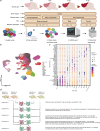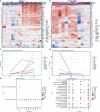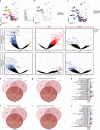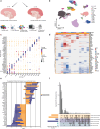Sex-specific single cell-level transcriptomic signatures of Rett syndrome disease progression
- PMID: 39384967
- PMCID: PMC11464704
- DOI: 10.1038/s42003-024-06990-0
Sex-specific single cell-level transcriptomic signatures of Rett syndrome disease progression
Abstract
Dominant X-linked diseases are uncommon due to female X chromosome inactivation (XCI). While random XCI usually protects females against X-linked mutations, Rett syndrome (RTT) is a female neurodevelopmental disorder caused by heterozygous MECP2 mutation. After 6-18 months of typical neurodevelopment, RTT girls undergo a poorly understood regression. We performed longitudinal snRNA-seq on cerebral cortex in a construct-relevant Mecp2e1 mutant mouse model of RTT, revealing transcriptional effects of cell type, mosaicism, and sex on progressive disease phenotypes. Across cell types, we observed sex differences in the number of differentially expressed genes (DEGs) with 6x more DEGs in mutant females than males. Unlike males, female DEGs emerged prior to symptoms, were enriched for homeostatic gene pathways in distinct cell types over time and correlated with disease phenotypes and human RTT cortical cell transcriptomes. Non-cell-autonomous effects were prominent and dynamic across disease progression of Mecp2e1 mutant females, indicating that wild-type-expressing cells normalize transcriptional homeostasis. These results advance our understanding of RTT progression and treatment.
© 2024. The Author(s).
Conflict of interest statement
The authors declare no competing interests.
Figures





Update of
-
Sex-specific single cell-level transcriptomic signatures of Rett syndrome disease progression.bioRxiv [Preprint]. 2024 May 19:2024.05.16.594595. doi: 10.1101/2024.05.16.594595. bioRxiv. 2024. Update in: Commun Biol. 2024 Oct 10;7(1):1292. doi: 10.1038/s42003-024-06990-0. PMID: 38798575 Free PMC article. Updated. Preprint.
References
MeSH terms
Substances
Grants and funding
- P30CA093373/U.S. Department of Health & Human Services | NIH | National Cancer Institute (NCI)
- S10OD010786/U.S. Department of Health & Human Services | NIH | NIH Office of the Director (OD)
- S10 OD018223/OD/NIH HHS/United States
- S10OD018223/U.S. Department of Health & Human Services | NIH | NIH Office of the Director (OD)
- R01 HD112991/HD/NICHD NIH HHS/United States
- P30 ES023513/ES/NIEHS NIH HHS/United States
- P50 HD103526/HD/NICHD NIH HHS/United States
- S10 OD010786/OD/NIH HHS/United States
- R01AA027075/U.S. Department of Health & Human Services | NIH | National Institute on Alcohol Abuse and Alcoholism (NIAAA)
- R01 AA027075/AA/NIAAA NIH HHS/United States
- P30 CA093373/CA/NCI NIH HHS/United States

